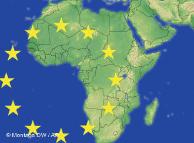EU defends Zimbabwe sanctions on eve of talks with Mugabe in Harare
 Johannesburg - The European Union (EU) defended its targeted sanctions against Zimbabwe at an EU-South Africa summit on Friday amid calls from Zimbabwe's southern African neighbours for the sanctions to be lifted, despite ongoing human rights violations in the country.
Johannesburg - The European Union (EU) defended its targeted sanctions against Zimbabwe at an EU-South Africa summit on Friday amid calls from Zimbabwe's southern African neighbours for the sanctions to be lifted, despite ongoing human rights violations in the country.
"We are not talking about economic sanctions," Karel De Gucht, EU commissioner for development and humanitarian aid, told the second EU-South Africa summit, which is being held this year in Cape Town.
Because the sanctions imposed targeted individuals, they had no impact on the general population, De Gucht said, responding to claims within Zimbabwe that the measures were barring the country's road to economic recovery.
In 2002, the EU slapped travel bans and asset freezes on Mugabe and scores of members of his inner circle.
A summit of Southern African Development Community (SADC) leaders, including Mugabe, earlier this week called for the sanctions to be lifted - a call the EU has rebuffed.
The EU and the US have said they will not remove the restrictive measures until seeing signs of greater reform in Zimbabwe, where a seven-month power-sharing government has restored a measure of economic stability but Mugabe's opponents continued to be harassed.
"We see still the use of violence directed against the supporters of (Zimbabwe's prime minister Morgan) Tsvangirai and also the abuses still of human rights," Swedish Prime Minister Fredrik Reinfeldt, whose country currently holds the rotating EU presidency, said in Kleinmond.
The sanctions are expected to figure prominently in talks in Harare this weekend between Mugabe and Tsvangirai on the one hand, and senior EU officials on the other.
De Gucht, Swedish International Development Cooperation Minister Gunilla Carlsson and a representative from Spain, which takes over the EU presidency next year, will visit Zimbabwe in the highest-level EU visit to the country in seven years.
Among other issues on the agenda of the EU-SA summit were climate change, trade and the global recession.
While some European countries such as France and Germany have already returned to the growth path, South Africa is still mired in a recession that cost the country half a million jobs in the first six months of the year.
The European Commission and the United Kingdom Department for International Development (DFID) said they would give South Africa 1.3 billion rand (around 166 million dollars) for a programme to find "innovative ways" of creating jobs.(dpa)